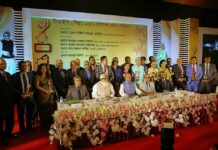3G services has emerged as a big threat for security because smartphone-based communication applications cannot be monitored
A high profile intelligence agency has recently requested BTRC to not allocate anymore of the 3G spectrum to operators, when the regulator has been making preparations to offload unused 15 megahertz, sources said.
In a letter sent to the Bangladesh Telecom Regulatory Commission (BTRC) in December, the agency
said easy access to 3G services has emerged as a big threat for security because smartphone-based communication applications cannot be monitored.
Earlier this week, the government blocked popular mobile internet-based voice and text messaging applications Viber, Tango, Whatsapp, etc, saying they were being used by criminals to create anarchy in the streets during the ongoing blockade of the BNP-Jamaat-led alliance.
Sources said copies of the letter have also been sent to State Minister for Home Assaduzzaman Khan Kamal and State Minister for ICT Junaid Ahmed Palak.
The Dhaka Tribune contacted the BTRC several times in the last few days but nobody was ready to make any comment in this regard.
When contacted last week, State Minister for ICT Junaid Ahmed Palak denied receiving any such letter; but said he also thinks militants are taking advantage of the 3G facilities.
He told the Dhaka Tribune: “There is no doubt that popular voice and messaging services are not being
monitored and hence they are threats for the nation.”
He also said: “But I am not in a position to comment on spectrum allocation. It is BTRC’s issue. If necessary, the prime minister will make a decision in this regard because she is in charge of the telecom ministry,” Palak said.
Senior officials from a number of mobile operators have said that they had also heard about such a letter from an intelligence agency but none of them were ready to say anything on record.
“This type of requests will not help the cause of building a digital Bangladesh,” a senior executive officer of a mobile operator told the Dhaka Tribune requesting anonymity.
“Similar requests delayed our joining the submarine cable in the early 1990s,” he said.
The agency letter reads: “Terrorist groups, militants and anti-state elements are carrying out terror and subversive activities using the facilities of communication devices such as mobile phones and Internet technologies such as Viber, Skype, Tango and WhatsApp.”
The 3G spectrum is like a natural resource; it is scarce but not perishable. Every country has its own unique signal transmission frequency spectrum. Through auction, a government sells the rights or licences to transmit signals over specific bands of the electromagnetic spectrum to telecommunication companies.
Market sources said the six mobile operators in the country are already enjoying 25MHz of the existing 40MHz spectrum. Expecting to have a much wider subscriber base in the near future, all these operators now want more from the remaining spectrum chunk.
The BTRC is now on the final stage of arranging an open auction for offloading the remaining 15MHz spectrum in the 2100 band and 10.6MHz in the 1800 band.
The telecom watchdog expects to earn more than Tk5,000 crore by selling the remaining spectrum.
In an open auction in September 2013, market leader Grameenphone acquired 10MHz and Banglalink, Robi and Airtel took 5MHz each.
Before that, in October 2012, the lone state-owned mobile operator Teletalk took 10 MHz spectrum for a commercial test run of 3G.
At present, Grameenphone has 32MHz spectrum, Teletalk 25.2MHz, Banglalink and Airtel 20MHz each and Robi enjoys 19.8 MHz spectrum.
Source: Dhaka Tribune









